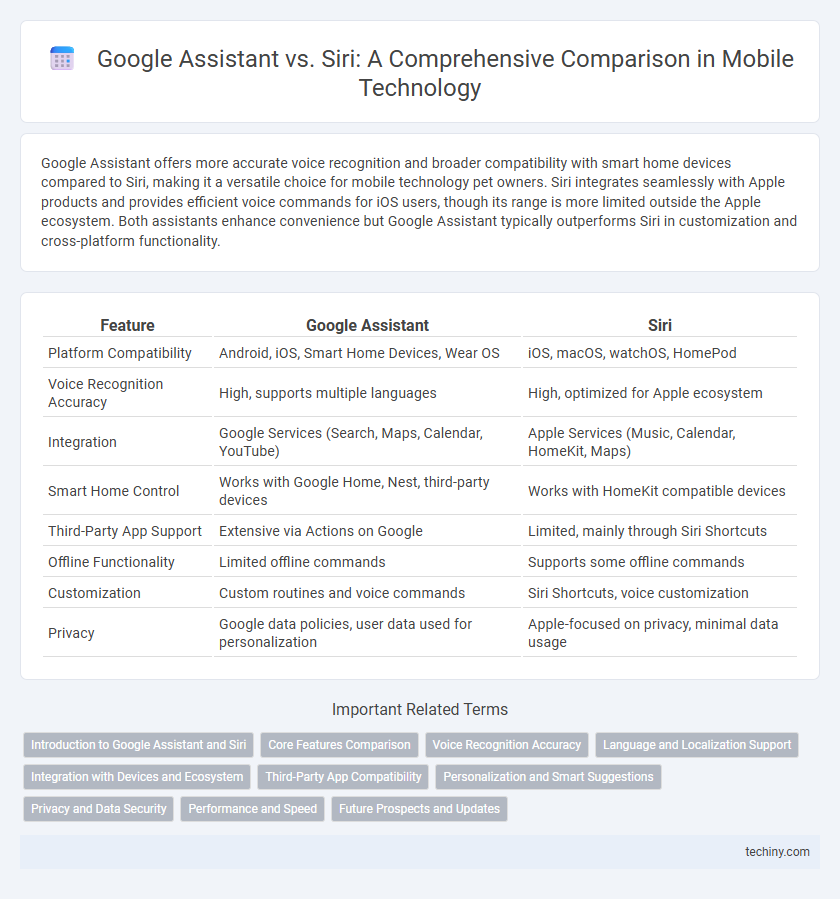Google Assistant offers more accurate voice recognition and broader compatibility with smart home devices compared to Siri, making it a versatile choice for mobile technology pet owners. Siri integrates seamlessly with Apple products and provides efficient voice commands for iOS users, though its range is more limited outside the Apple ecosystem. Both assistants enhance convenience but Google Assistant typically outperforms Siri in customization and cross-platform functionality.
Table of Comparison
| Feature | Google Assistant | Siri |
|---|---|---|
| Platform Compatibility | Android, iOS, Smart Home Devices, Wear OS | iOS, macOS, watchOS, HomePod |
| Voice Recognition Accuracy | High, supports multiple languages | High, optimized for Apple ecosystem |
| Integration | Google Services (Search, Maps, Calendar, YouTube) | Apple Services (Music, Calendar, HomeKit, Maps) |
| Smart Home Control | Works with Google Home, Nest, third-party devices | Works with HomeKit compatible devices |
| Third-Party App Support | Extensive via Actions on Google | Limited, mainly through Siri Shortcuts |
| Offline Functionality | Limited offline commands | Supports some offline commands |
| Customization | Custom routines and voice commands | Siri Shortcuts, voice customization |
| Privacy | Google data policies, user data used for personalization | Apple-focused on privacy, minimal data usage |
Introduction to Google Assistant and Siri
Google Assistant and Siri are leading virtual assistants integrated into mobile technology, with Google Assistant powered by advanced AI from Google and Siri developed by Apple for iOS devices. Google Assistant excels in natural language processing and broader third-party app integration, enabling users to perform tasks, control smart home devices, and retrieve information efficiently. Siri offers seamless integration within the Apple ecosystem, providing personalized assistance, voice commands, and enhanced privacy features for iPhone, iPad, and Mac users.
Core Features Comparison
Google Assistant offers robust voice recognition, seamless integration with Google services, and advanced AI-powered contextual understanding, enabling precise responses and personalized recommendations. Siri excels in device-level optimization within the Apple ecosystem, supporting hands-free commands, smart home controls via HomeKit, and enhanced privacy features. Both assistants provide real-time language translation, proactive suggestions, and support for third-party app integration, but Google Assistant tends to deliver broader search capabilities and deeper contextual interactions.
Voice Recognition Accuracy
Google Assistant demonstrates superior voice recognition accuracy compared to Siri, benefiting from advanced natural language processing algorithms and extensive machine learning datasets. Studies show Google Assistant correctly interprets user queries with over 95% accuracy, outperforming Siri's approximate 85-90% accuracy rate in diverse acoustic environments. This higher precision enables smoother user interactions and more reliable execution of voice commands on Android devices.
Language and Localization Support
Google Assistant supports over 30 languages and offers real-time language translation features, enhancing communication across diverse regions. Siri supports 21 languages with localized dialects, focusing on integration within the Apple ecosystem for seamless regional usage. Both assistants continuously expand their language databases to improve contextual understanding and regional accuracy in mobile technology.
Integration with Devices and Ecosystem
Google Assistant offers extensive integration across a broad range of devices including Android smartphones, smart speakers, smart displays, and third-party smart home gadgets, providing seamless control within the Google ecosystem. Siri is tightly integrated with Apple's ecosystem, working effortlessly with iPhones, iPads, Macs, Apple Watches, HomePods, and other Apple services, ensuring cohesive user experiences. Google Assistant supports greater interoperability with non-Apple devices, while Siri excels in optimized performance within exclusive Apple hardware and software environments.
Third-Party App Compatibility
Google Assistant offers broader third-party app compatibility compared to Siri, supporting integrations with a wide range of services including Spotify, Uber, and WhatsApp, enhancing user convenience across platforms. Siri primarily supports Apple's ecosystem and selected third-party apps through SiriKit, which limits its functionality to predefined domains such as messaging, payments, and workouts. Developers favor Google Assistant's open API, enabling more extensive customization and deeper integration with diverse applications.
Personalization and Smart Suggestions
Google Assistant leverages advanced machine learning algorithms and extensive user data to deliver highly personalized responses and proactive smart suggestions tailored to individual habits and preferences. Siri integrates personalization through on-device intelligence, prioritizing user privacy while providing context-aware recommendations based on usage patterns and location data. Both assistants continuously adapt to enhance user experience by anticipating needs and streamlining daily tasks through intelligent, personalized interactions.
Privacy and Data Security
Google Assistant and Siri employ advanced encryption protocols to safeguard user interactions, with Google leveraging machine learning on encrypted data to enhance personalized experiences without compromising privacy. Siri processes the majority of voice commands locally on Apple devices, minimizing data transmission to cloud servers, which significantly reduces exposure to potential breaches. Both assistants offer robust privacy controls, but Apple's emphasis on on-device processing is often viewed as a stronger safeguard against unauthorized access to personal information.
Performance and Speed
Google Assistant demonstrates superior performance and speed compared to Siri, leveraging advanced natural language processing and real-time data integration to deliver faster, more accurate responses. Its ability to process complex queries and execute tasks seamlessly across multiple devices enhances user experience significantly. Siri, while integrated deeply into Apple's ecosystem, often exhibits slower response times and limited contextual understanding in comparison.
Future Prospects and Updates
Google Assistant is rapidly advancing with AI-driven conversational capabilities and enhanced integration across smart home devices, signaling a future of deeper contextual understanding and proactive assistance. Siri's future updates emphasize on-device processing to bolster privacy while expanding its functionality through tighter Apple ecosystem integration and improved natural language processing. Both platforms are investing heavily in machine learning to deliver more personalized, seamless user experiences in mobile technology.
Google Assistant vs Siri Infographic

 techiny.com
techiny.com